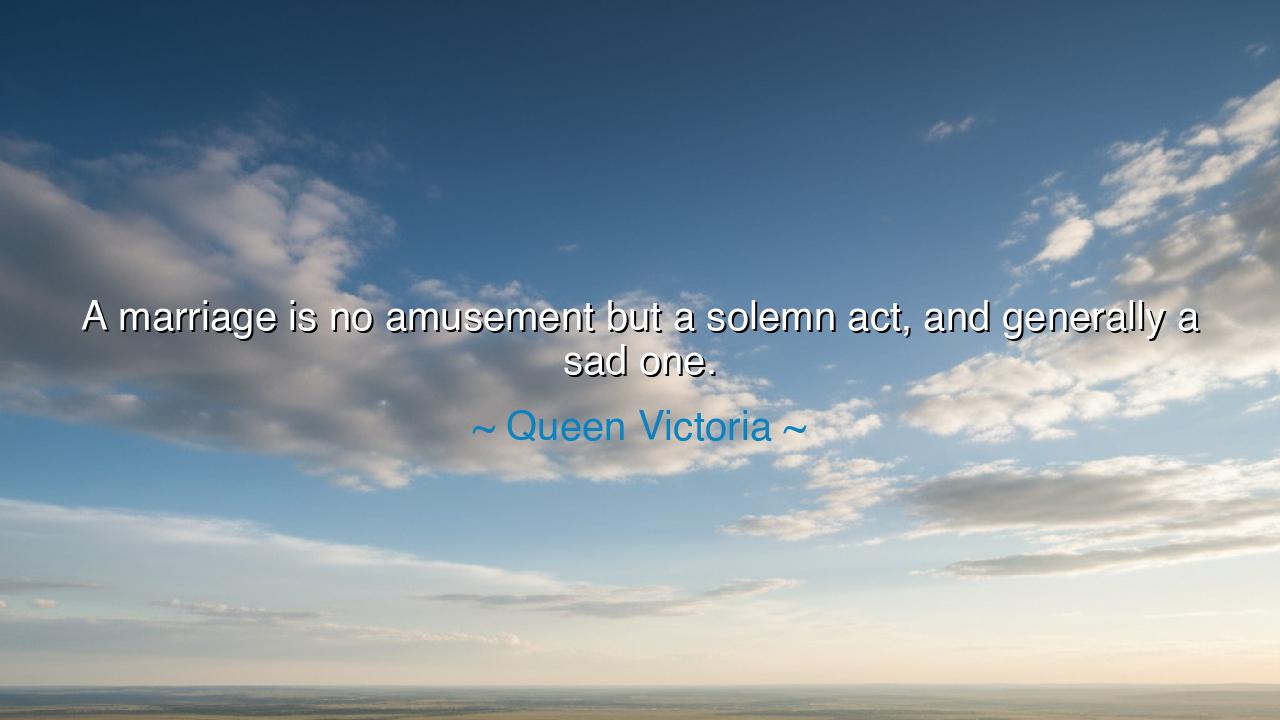
A marriage is no amusement but a solemn act, and generally a sad






Queen Victoria once declared with a mixture of gravity and sorrow: “A marriage is no amusement but a solemn act, and generally a sad one.” These words, spoken by a queen yet also by a woman who knew both the splendor and the anguish of wedded life, reveal an ancient truth often veiled by the pageantry of love. In them, she acknowledges that marriage, while celebrated with feasts and ceremony, carries with it burdens, sacrifices, and sometimes grief that outweigh the fleeting joy of its beginning.
When she names marriage as a solemn act, Victoria reminds us that it is not a mere entertainment, nor a light diversion for the heart. In her own age, as in ages past, marriages were often bound not only by affection but by duty—duty to family, to crown, to country. Even for those not royal, the act of marrying bound souls together in law, in expectation, and in obligation. To stand before altar or magistrate was to accept a weight that could not be easily cast aside. Thus, she speaks with the wisdom of one who knew that love may ignite marriage, but solemnity sustains it.
Her words grow darker when she calls it “generally a sad one.” Here, the queen’s personal life bleeds into her philosophy. She was deeply devoted to Prince Albert, and when he died young, her marriage became for her a memory wrapped in mourning. From this sorrow, she may have seen marriage not as a perpetual festival but as an act that often led to heartbreak—whether through duty unfulfilled, affection unreturned, or the cruel hand of death. Her words echo the laments of widows and widowers across centuries: that to bind one’s soul to another is also to risk a grief deeper than any other.
Yet history offers us many examples where her insight rings true beyond her own life. Consider the great Cleopatra, whose marriages were entangled with politics and whose loves ended in tragedy. Or Eleanor of Aquitaine, who endured marriages that were more about alliances than affection, carrying their burdens for the sake of kingdoms rather than personal joy. In such lives, marriage was solemn indeed, and often sad—not because love was absent, but because duty and fate pressed heavily upon it.
Still, in Victoria’s lament there lies a paradox. She herself once knew great joy in marriage before sorrow overtook it. And so her words remind us that marriage holds within it both extremes: the ecstasy of union and the agony of loss. It is solemn because it binds; it is sad because all bonds are vulnerable to time, to trial, and to mortality. The ancients often warned that to love deeply is to invite sorrow, for every bond of affection carries the shadow of parting.
The lesson we may take is not to scorn marriage, but to approach it with reverence. Marriage is not amusement. It demands seriousness, patience, and courage. To enter it lightly is folly, for it is a covenant that requires sacrifice. But nor should we despair at its sadness. Instead, we must recognize that love, even when shadowed by grief, ennobles the soul. The sorrow that may come is the price of the joy that once was—and to refuse the risk is to refuse the fullness of life itself.
Therefore, let those who seek marriage take heed. Do not view it as a perpetual feast or a mere ornament of life. See it as a covenant that will test you, shape you, and at times wound you. Enter it not for amusement, but with eyes open, heart steadfast, and spirit prepared. And should sadness come, remember Queen Victoria’s own life: that even in mourning, love leaves a legacy that endures beyond the grave.
Thus, her words, though somber, are filled with wisdom. They teach us that marriage is both solemn and fragile, joyous and sorrowful, a mingling of light and shadow. And those who honor it with reverence, while bracing themselves for its trials, will find not mere amusement, but the depth of a life fully lived.






AAdministratorAdministrator
Welcome, honored guests. Please leave a comment, we will respond soon